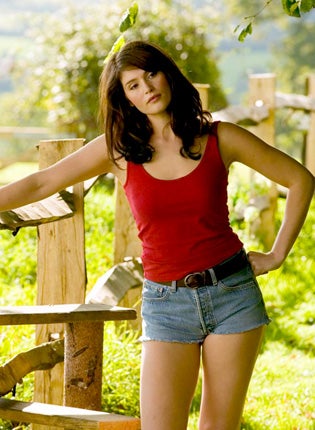First Night: Tamara Drewe, Cannes Film Festival
A pretty tale of countryside alliances – but hardly Hardy

Stephen Frears' big-screen version of the Posy Simmonds comic strip is a very cosy, middlebrow affair. Imagine Martin Scorsese in Ambridge adapting The Archers and you'll come close to its essence. It's amiable enough, has plenty of picture-postcard imagery of rural England (with hens and cows to the fore) and Gemma Arterton looks very fetching in her denim shorts. This, though, isn't exactly Frears at full throttle. There is precious little of the dark passion that ran through Thomas Hardy's Far from the Madding Crowd (to which constant reference is made) here.
Arterton plays a music journalist writing for The Independent (of all papers) who returns to the rural village where she grew up. She has had a nose job, drives a Mini, and is now very much more poised and glamorous than when she left as a gawky young woman.
The village is home to arrogant novelist Nicholas Hardiment (Roger Allam), who cheats on his wife, the long-suffering Beth (Tamsin Greig.) It's also where the brooding country lad Andy Cobb (Luke Evans) lives. He is a former boyfriend of Tamara's and clearly still harbours strong feelings for her.
Frears plays up the comic elements in the story. In particular, he foregrounds the antics of two mischievous, bored teenage girls who spend their days throwing eggs at cars and lusting after pop star Ben Sergeant (Dominic Cooper). When Tamara begins an affair with Ben, these little harpies conspire against her in ever more demented fashion.
Frears shows the British countryside in rose-tinted fashion. It never seems to rain. The houses all have thatched roofs. Even the hens are photogenic.
The plotting is entirely predictable. The film's protagonists are eminently middle-class types who have ovens in their country kitchens and base their lives round Radio 4 schedules (there is even a cameo from James Naughtie). When they're not writing or reading crime novels or tending the livestock, these characters are primarily obsessed with sex. The arrival of Tamara sets them all a-flutter. Tamara herself is cheerfully promiscuous.
In its own quaint fashion, Tamara Drewe is likeable and funny enough. The tone, though, is very uneven. The inane humour and jokes about the differences between country and city life eventually begin to grate. In the latter part of the film, as the tone darkens, Frears' glib, upbeat storytelling style seems inappropriate. In Thomas Hardy adaptations, we're painfully aware of class and sexual tension. When affairs go awry, the consequences are tragic. Here, nothing much seems at stake. Frears orchestrates one memorable action sequence – a cattle stampede. Just occasionally, he hints at the insecurity of Tamara (abandoned as a kid by her father) and the unhappiness of Beth, who begins to discover details about her husband's philandering by studying the plots of his old books. The characterisation is vivid but determinedly superficial. It's as if Frears is worried that if he probes too deeply, he will risk ruining the mood of jolly escapism that generally prevails.
Join our commenting forum
Join thought-provoking conversations, follow other Independent readers and see their replies
Comments
Bookmark popover
Removed from bookmarks